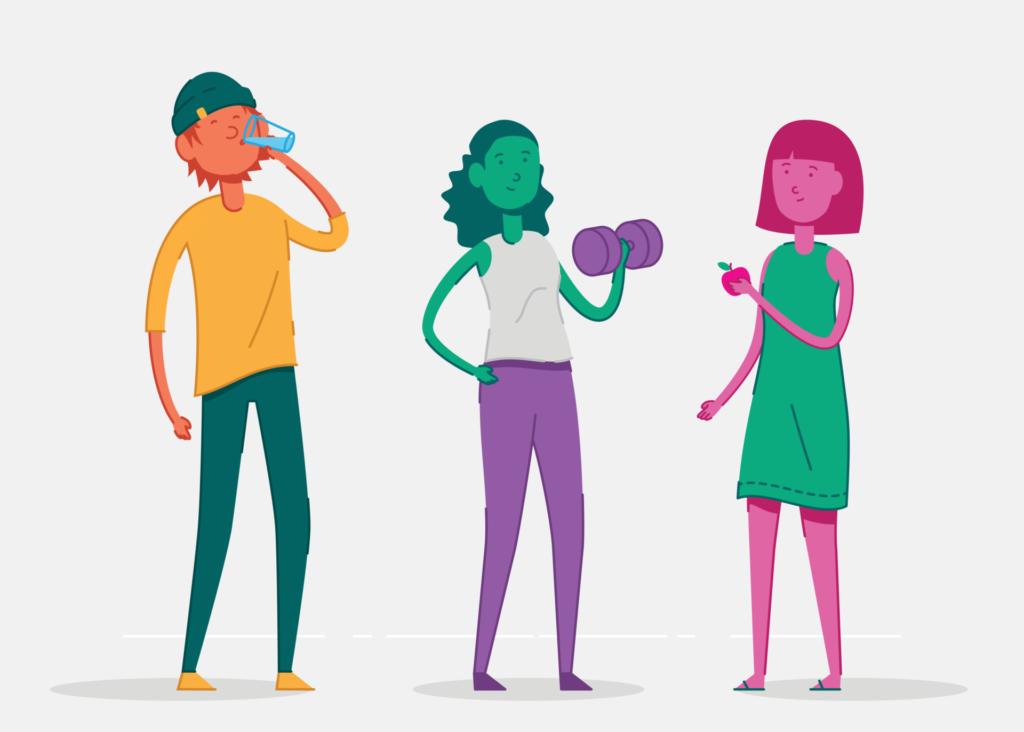The kidneys are a vital part of your bodily function. Two fist-sized, bean-shaped organs located in the lower back, their primary function is to filter blood and regulate the balance of bodily substances in the blood. They take in nutrients for productive use in the body and filter out toxins and waste for removal. The kidneys also control blood pressure with hormones, activate Vitamin D in the body and make red blood cells for oxygen dispersal. Having healthy kidneys is important to your overall wellness, but you may not know your kidneys are having problems until the problems are at a dangerous level. That’s why, to commemorate National Kidney Month, we have some tips for you on how to keep your kidneys healthy.
Stay Hydrated
Proper hydration is a vital part of your health. The reality today, however, is that fewer people than ever are actually getting enough water to drink during the day. Many drinks, such as coffee, soda and sweet tea, don’t have enough water in them to adequately hydrate you. Many of them also leave you thirstier than you were before because of their high sugar, caffeine and sodium content. Since excessive amounts of these ingredients also put a lot of stress on your liver, it’s a good idea to practice moderation with such drinks and choose water as your everyday drink.
A good rule of thumb is to drink 6-8 glasses of water a day. Hydrating keeps your entire body, including your kidneys, healthy, strong and working properly.
Exercise
Regular exercise also helps the body stay active and working properly, and helps it handle stress. Weight gain and high blood pressure are linked to kidney disease, but getting plenty of exercise will help reduce both of those.
It’s important, however, to not overdo activity if you’re not accustomed to regular exercising. Bodily stress is felt a lot in the kidneys, and regularly pushing yourself beyond your abilities can actually harm your overall health. This is particularly true if you have other health conditions that mean you need to be careful how much you exert yourself. Also, before starting a new exercise plan, consult with your doctor about how you should proceed.
Proper Diet
Eating the right foods will give your kidneys plenty of nutrients to distribute throughout your body and help them stay healthy and strong. Eating the wrong foods will put stress on it from all of the toxins or unnecessary extra substances it needs to remove from your body. This is why a balanced diet is so important to your kidney health.
Eating a diet rich in vitamins and healthy fats will aid your kidney. Omega-3 fatty acids from foods like fish will actually reduce the amount of fat in your blood and may help lower your blood pressure. Practice moderation with red meats like beef, since the fat in it is not as healthy. Sweet potatoes also have great nutrients in them, such as potassium, and can help manage the amount of sodium in your blood to take pressure off your kidneys. Dark leafy greens such as spinach and kale are also rich in vitamins and nutrients and contain antioxidants that assist your liver in getting rid of unneeded substances.
Finally, while vitamins and herbal supplements can be of great help to your body, some types and amounts may not help your kidney health, and may even harm it. Talk to your doctor about what supplements you should take to keep yourself healthy.
Moderate Risky Lifestyle Behaviors
Many lifestyle choices can harm your kidneys’ level of functionality. Smoking is one of them. Smoking puts a lot of pressure on your kidneys by delivering harmful and toxic chemicals to your body that it has to work hard to remove. It also damages and narrows blood vessels, leading to lower blood flow to the kidney, and can play a part in causing kidney cancer. Even the nicotine and other chemicals from cigarette alternatives like vaping can put undue stress on your kidneys.
Another risky behavior that’s dangerous to your kidney health is excessive alcohol consumption. Since it’s the kidneys’ job to filter out harmful substances, alcohol consumption gives them more work to do. This is partly due to the fact that alcohol also affects the liver, which has a similar job as the kidneys. Like sugary drinks, alcohol also dehydrates the body, and it can also raise blood pressure. So if you’re at risk for kidney disease, it’s important to know how much alcohol is too much for you.
Use Over-the-Counter Medicines In Moderation
Common non-prescription pain relievers like ibuprofen, naproxen and aspirin can harm your kidneys if taken too regularly and in too high a dose. If you have regular pain, talk to your doctor about better ways to manage it that won’t put your kidneys as much at risk.
Get Tested
Poor kidney health brings about a lot of risks in life. It puts the body in danger of conditions such as cardiovascular disease, high blood pressure, weak bones and kidney failure, to name a few. You may already be at risk for kidney disease if you already have these conditions or a family history of them. Chronic conditions like diabetes may also put you at risk.
One of the best ways to keep your kidneys healthy beyond lifestyle changes is to get a screening for disease. Kidney dysfunction often doesn’t show symptoms until the problem is well-developed and difficult to treat. Keeping an eye on them regularly with your primary care physician is a good idea if you think you’re at risk for kidney disease. We can help with this at Community Access Network, where our goal is to help you stay well. Contact us or walk into one of our locations today!
